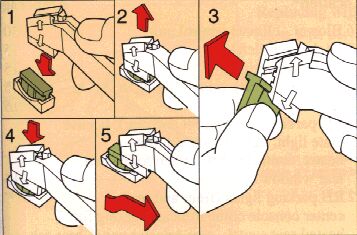
| pg. 6:13 Fuses (cont.) |

It is necessary to remove the fuses to see if they are blown, see next page for information on fuses and related circuits.
If you find it difficult to obtain access to the fuses, unclip the fuse tool on the right-hand side of the fuse compartment and use it to remove the fuse, see illustration.
1 Press the tool onto the fuse.
2 Pull the tool and fuse straight up
3 Pull out the fuse from the tool and push in a new fuse in the same way.
4 Push in the fuse in the fusebox with the tool.
5 Slide the tool out.

The fuses are removed by pulling them straight out. If they are defective, the metal wire is broken. When fitting a new fuse, be certain to use one with the same amperage and color as the one removed (see top of fuse)! Spare fuses are located on each side of the fusebox (1x15A, 1x25A, 1x30A).
| pg. 6:14 Fuses (cont.) |
Location*
Amperage
1 Fuel pump (main), engine control systems
25
2 Central locking, hazard warning flashers, headlight flashers
25
3 Power seats
30
4 Brake lights
15
5 Glove compartment light, clock, audio system, interior light, trunk light, door open warning,antenna, vanity mirror lights
15
6 Blower - climate control unit
30
7 Front fog lights
15
8 Electrically operated windows
30
9 Warning light, seat belt, turn signals, heated front seats, electrically-operated windows, shift-lock
15
10 Heated rear window power sunroof heated side-view mirrors
30
11 Fuel pump (tank), heated oxygen sensor
15
12 Back-up lights, cruise control, disengagement of 4th gear on automatic transmission
15
13 Spare
14 Electrically-operated side view mirrors, cigarette lighter, radio, rear wiper/washer (wagon), ambient temperature sensor
15
15 Horn, windshield wash/wipe, power seats
25
16 Blower - climate control unit
30
17 High beam (left)
15
18 High beam (right)
15
19 Low beam (left), relay - fog light(s)
15
20 Low beam (right)
15
21 LH parking lights (front and rear), license plate light, light for: ash tray, heater, control panel, switch for heated rear window
15
22 RH parking lights (front and rear), center console compartment, lighting for: heated seat switch, gear selector panel, rear ash tray
15
23 Heated front seats
25
24 Spare
25 Rear fog light
25
26 Audio system
15
for more detailed information concerning function and location of relays, fuses, etc., refer to the Volvo Service Manuals. These can be purchased directly using the Service Literature Brochure/Order form or through your Volvo dealer.
* Some of the equipment/systems listed may be available on certain models only.
| NOTE: On cars equipped with ABS, the system is protected by an additional 10A fuse located under the instrument panel to the left of the steering wheel. |
| pg. 6:15 Replacing wiper blades, Adjusting washer nozzles |
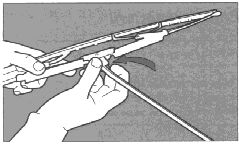
|
Replacing wiper blades
Lift the wiper arm off the windshield and hold blade at right angles to arm. Pinch the end of the plastic clip located at the back of the arm. Slide the wiper blade along the arm to release it from the hook. |
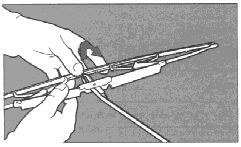
|
Install new blade (installation is the reverse of removal) and make sure that it is properly attached to the wiper arm.
for reasons of safety, you should change the windshield wiper blades as soon as they start to leave marks on the windshield or fail to wipe efficiently and cleanly. |
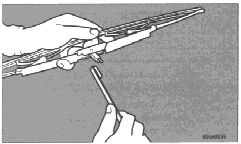
| To obtain maximum lifetime from a set of wiper blades, clean them with a stiff-bristle brush and warm, soapy water as part of a normal car wash. |
Adjusting washer nozzles
The washer jets should spray the windshield as shown. Use the edge of a small screwdriver to adjust the nozzles, if necessary.
Washer fluid reservoir
The washer fluid reservoir is located in the engine compartment and holds approx. 0.5 US gal. (2.0 liters) on sedan models and approx. 0.8 US gals (3.2 liters) on wagon models.
During cold weather, the reservoir should be filled with windshield washer solvent.
| pg. 6:16 Service diagnosis |
This section contains information which can be of help in the event of a breakdown. Only those faults which can be rectified with the vehicle's tool kit are listed.
| The engine does not start or is difficult to start. |
The instructions for starting the engine have not been followed.
follow the instructions in section "Starting the engine".
The battery is poorly charged or dead
Start the vehicle by using an auxiliary battery.
Recharge the battery.
Find out why the battery is poorly charged.
Poor contact in the electrical system
Check all leads to spark plugs, coil, distributor, battery and starter motor.
No fuel reaching engine
Check that there is fuel in the tank.
Check that none of the hoses in the fuel system are loose.
Check that the fuses for the pump are not faulty, fuses No. 1 and 11.
Faulty distributor ignition system
Check spark plugs, electrode gap should be 0.028" (0.7 mm), and wipe clean.
Check distributor cap for cracks and wipe clean on inside.
Check that all electric leads in the distributor ignition system are clean and correctly connected.
| Misfiring and erratic engine operation |
Faulty distributor ignition system
Check spark plugs, electrode gap should be 0.028" (0.7 mm), and wipe clean.
Check distributor cap for cracks and wipe clean on inside.
Check that all electric leads in the distributor ignition system are clean and correctly connected.
Ice in injection system
Park the vehicle in a warm garage and add fuel line de-icer to the fuel system.
Blocked air cleaner/fuel filter
Change cleaner/filter
| pg. 6:17 Service diagnosis (cont.) |
| Tire imbalance or vibration during driving |
Wheel imbalance
Have the wheels re-balanced.
Level of oil in power-assisted steering pump too low
Check and fill oil, see section "Power steering fluid".
| Engine overheats |
Radiator hose cracked or leaking
Check and replace if necessary
Insufficient coolant
Check and fill coolant, see section "Cooling system".
Fan belt frayed or belt tension incorrect
Replace or adjust tension.
| pg. 6:18 Service diagnosis (cont.) |
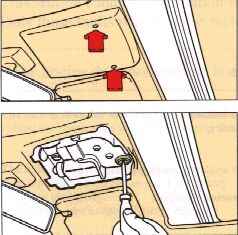
Emergency sun roof operation
If, because of an electrical fault (e.g. a blown fuse), it is not possible to operate the sun roof electrically, then it is manually.
First, using a small screwdriver, remove the two screws that secure the sun roof motor cover to the headliner. Then using a screwdriver, depress the white plastic clutch pin in the center of the motor screw (see illustration) and turn the screw to close or open the roof as desired.
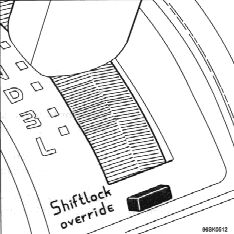
Shiftlock release
The gear selector is locked in the P position. To manually release the shift lock, turn the starting (ignition) key to position I and press firmly on the "SHIFTLOCK OVERRIDE" button located near the base of the gear selector (see illustration). While holding the override button down, move the gear selector from the (P)ark position.